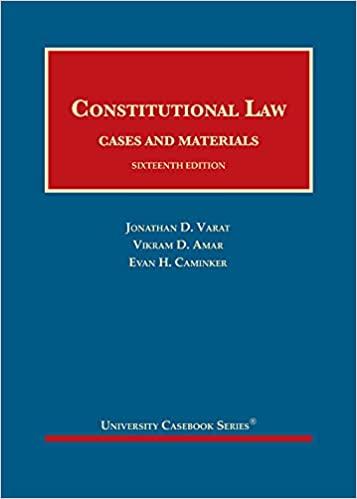Question
1. A legislature may create an administrative agency and delegate its authority to regulate particular industries or areas of the law to an agency with
1. A legislature may create an administrative agency and delegate its authority to regulate
particular industries or areas of the law to an agency with greater experience or expertise
through the passage of a statute known as an _______________ Act.
2. In the event that a regulation is not lawfully authorized by an enabling statute, anyone affected
by the regulation may successfully challenge that regulation on the basis that the agency
________________.
3. The primary purpose of the _______________ Act is to subject administrative agency action to
public scrutiny.
4. Administrative agencies are typically given great deference and broad _____________ in making
their decisions on whether to regulate certain issues and in how they interpret their own
regulations.
5. When an administrative agency proposes a regulation, federal law requires the publication of
the proposed administrative regulation in the _________________________. This publication
constitutes constructive notice to the public of the proposed regulation and allows for public
comment on the proposed regulation by interested businesses and parties.
6. Administrative agencies are required to honor the constitutional rights of individuals and
businesses but lesser protection is afforded to business records since the records custodian of a
business or corporation is not entitled to invoke the privilege against self-incrimination for
records required by law to be maintained.
7. Administrative agency actions are presumed to be ______________________ and, as a result, a
person or business seeking the reversal of an agency action has the burden of proving a valid
ground for reversal of the agency's action.
8. Because of the requirement of ___________________________, a party aggrieved by an agency
enforcement action may not appeal the agency's decision to the Courts unless the agency issues
a "final decision" on the matter.
9. In the case of
Hornbeck Offshore Services, LLC v. Salazar
, summarized in your eText, the Plaintiffs
successfully challenged the agency's 6-month moratorium on proposed drilling in the Gulf of
Mexico on the grounds that the agency action was _________________________.
10. In the case of
F.C.C. v. Fox Television Stations
, in your eText, Fox and ABC successfully asserted a
First Amendment challenge to the FCC fines imposed for allegedly obscene programming
because the obscenity standards used by the agency were ________________________.
Section II. Short Answer
. (
Max. 15 Points
)
This Section consists of three questions, each worth five points. Maximum points for this Section
equal fifteen (15) points.
A. Administrative agencies are generally required by the Due Process Clause to hold an
administrative hearing when it decides to enforce its regulations against an individual or a
business entity. However, agency enforcement hearings are typically less formal than a judicial
or court hearing and there are significant differences between a judicial proceeding and a quasi-
judicial hearing. Identify three differences between the two types of hearings.
B. Explain what an "arbitrary and capricious" administrative action is and its relevance to
administrative law in general.
C. Identify three types of "Due Process" defenses that may be considered and asserted by an
individual or a business in response to an adverse enforcement action of a regulatory agency.
Section III. Practical Skills Section
.
(Max. 15 Points)
This Section consists of four short answer questions. Questions A and B introduce the Student to a
basic method of finding a state statute through WestLaw. Questions C and D require the
demonstration of the practical skills of finding and reading a NJ Supreme Court opinion. Maximum
points for this Section equal fifteen (15).
A. Using Westlaw Campus Research, click on "Statutes and Court Rules," search the New Jersey
Statutes and find the state's "Administrative Procedures Act" by typing its title into the search
bar. The Statute may be found under Title 52, Chapter _______. (2 Points)
B. Using Westlaw Campus Research, click on "Statutes and Court Rules," search the New Jersey
Statutes and find the state's "Open Public Meetings Act" by typing its title into the search bar.
The Statute may be found under Title ______, Chapter _______. (4 Points)
C. Find and review the case of
Tarus v. Borough of Pine Hill
, 189 N.J. 497 (2007) and summarize and
explain the findings of the New Jersey Supreme Court on the following question: Did the
Council violate the Plaintiff's right to videotape a municipal council meeting when it ordered him
to stop and had him arrested for refusing to do so? (5 Points)
D. In the
Tarus
case, explain whether the Council's actions towards the Plaintiff were "arbitrary,
capricious and unreasonable?" (4 Points)
Section IV. Optional Extra Credit (8 Points)
Find and review the case of In re Reallocation of Probation Officer, 441 N.J. Super. 434 (App. Div. 2015)
and summarize the finding of the Appellate Division in that case in one or two paragraphs. Be sure to
explain the "arbitrary and capricious" standard used by the Court to assess the agency's action.
Step by Step Solution
There are 3 Steps involved in it
Step: 1

Get Instant Access to Expert-Tailored Solutions
See step-by-step solutions with expert insights and AI powered tools for academic success
Step: 2

Step: 3

Ace Your Homework with AI
Get the answers you need in no time with our AI-driven, step-by-step assistance
Get Started


